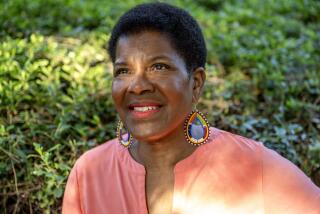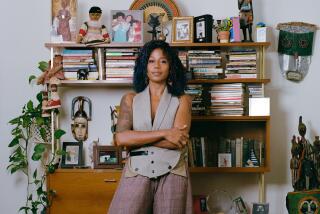Tory Dent, 47; Poet Wrote About Fight With AIDS
- Share via
Tory Dent, an award-winning poet who was diagnosed with HIV at age 30, later developed AIDS and wrote three volumes of poetry about her years of coping with her illness, has died. She was 47.
Dent died Dec. 30 of complications from the disease, at her home in New York City, said her husband, Sean Harvey.
In her books, “What Silence Equals” (1993), “HIV, Mon Amour” (1999) and “Black Milk” (2005), Dent explored her physical and emotional reality in graphic detail.
“Tory Dent has gone to a place where we are afraid to go, and come back with a vision,” wrote poet Sharon Olds in the introduction to Dent’s collection of 1993. The poems are “brilliant and unnerving,” Olds wrote.
Dent dedicated a number of works to poets, including Olds and Adrienne Rich.
“Tory Dent teaches us that poetry must speak out of extremity,” Rich said in an interview with National Public Radio lastweek.
Dent’s poetic language ranged from “great elegance to brutal realism,” Rich said.
In lengthy poems made up of unusually long lines, Dent traveled through the maze of doctors, hospitals and treatments that filled close to 20 of her 47 years. She referred to her AIDS diagnosis as “my life totaled in an indifferent instant to a disappointing sum.”
Hearing the news about her condition, she felt herself “rushed along the rapids, a houseboat out of whack,” she wrote in “At the Dark End of the Street.”
Her frequent hospital stays were dull and terrifying. In “Fourteen Days in Quarantine,” she described her room with the television “bolted too high” on the wall and recalled a conversation with her doctor:
On the evening before the TB drugs were reintroduced, my physician and I
tossed a coin in order to decide which one would likely cause another
allergic response....
Beyond the physical experience, Dent wrote about her inner world, filled with rage, grief and tenderness but not self-pity. In “Poems in American Sign Language,” she wrote:
People always assume they have a future
but only the sick know
how life is very, very short.
Another poem, “Immigrant in My Own Life,” said, “for seventeen years ... I’ve said ‘I won’t live another year.’ ”
At times she looked back to the good health she enjoyed in her youth, recalling “the thrill of unskilled kicking in lake water” in the poem “What Calendars Have Become.” In the same poem she asked favors of her failing body:
See me through this juncture to the threshold waiting like a waterfall ahead,
Flesh I have loved like no other. Don’t let it hurt. Don’t let it be too quiet.
Dent’s first collection, “What Silence Equals,” captured critical attention. Her second book, “HIV, Mon Amour” won the James Laughlin Award given by the Academy of American Poets.
“Being sick is isolating. Writing seems to cheer me up,” Dent said in a 2002 interview with the Cortland Review, an online literary magazine.
Putting illness into words “surprises me about what I’m feeling, what I’m thinking,” she said.
Asked how she had the energy to write, she said, “I’m not sure it’s uncommon in people who are fighting for their life.”
Born Victorine Dent in Wilmington, Del., she graduated from Barnard College in 1981 and earned a master’s degree in creative writing at New York University.
Besides poetry, Dent wrote critical essays and reviews for several literary and art journals.
She contracted HIV, the virus that causes AIDS, from her college boyfriend, a hemophiliac who later died of AIDS, Harvey said. Nine years later she was diagnosed with AIDS.
She married Harvey in 1999. In addition to him, she is survived by a brother, Stephen, and a sister, Melissa.
More to Read
Sign up for our Book Club newsletter
Get the latest news, events and more from the Los Angeles Times Book Club, and help us get L.A. reading and talking.
You may occasionally receive promotional content from the Los Angeles Times.







